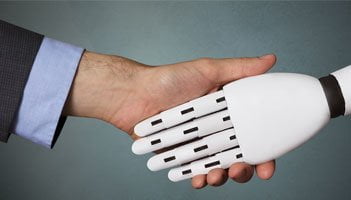The list of applications goes on and on. And it’s easy to see why there’s so much anticipation.
But if we really could let machines (or, more accurately, algorithms) make all those decisions, and take all those actions, and basically manage all those systems, would that cost us our jobs?
I don’t think so. I think marketers are going to be fine. In fact, I think we’ll do better than ever before.
Here are three reasons why:
Industries change, jobs change ― and so skills should change, too.
About 20 years ago, when “the commercial Internet” was young, I would read printouts of the server’s visitor logs from the website I worked for.
The printouts would be several inches thick. Each page would have the server logs of humans clicking from page to page, except back then our reporting was so basic that there would be a line for each item on the page that needed to be downloaded.
A visit to the site that involved anything more than someone looking at a website page or two could go on for two to three printed pages. The logs for a complete order would typically fill seven pages.
When Google Analytics and other traffic-reading tools came along, I was fine with giving up that part of my job ― reading server logs ― and letting it be automated into nice graphics-based reports.
I found other uses for my time.
So when AI and machine learning can take over some of your work, I bet you’ll find other things to do, too. Most of those repetitive, boring-as-all-get-out tasks you probably won’t even miss.
That’s one way of showing how skills have to change over time. This is true in almost any industry, but we marketers deal with it more than most.
Our skills need to evolve all the time.
So, if your job relies solely on your ability to lay out an email newsletter (for example), or your ability to set up a simple Facebook ad, or your ability to write a “filler” piece of content ― then yes ― your job may be in jeopardy.
Because machines (artificial intelligence, or the more “simple” machine learning) may be able to do all that not too long from now. Already, some of what we read is written by machines.
But as long as you can keep learning new skills, this is not going to harm your ability to earn a living.
Want a suggestion for one new skill to learn? How about data science or analytics? Data scientists are in demand right now, and will be in even more demand in the near future. An online course like the one General Assembly offers might work for you.
Technology has made marketers more effective ― and made us more valuable to our companies.
As you know, marketing technology has gotten a lot smarter and more effective in the last ten years ― even in the last two years.
Has that cost anybody their job? I’d say no.
Our new martech tools have let us be more effective. Proving return on investment is still dicey for some marketers, but more and more of us are able to demonstrate a positive ROI. That has led the C-suite to give us more budget and more resources.
So we’re better at what we do, and our responsibilities are expanding ― thanks to better technology.
As marketing ― and our competition ― has gotten more sophisticated, and as technology has allowed us to gain a much more holistic view of our customers, the idea of “customer experience” has bubbled up.
“Customer experience,” as you probably know, is a 360-degree view of how the customer finds, interacts, and purchases from us. It covers everything from their introductory “first touch” with us when they see one of our ads or articles, and goes all the way through the sales cycle to when they are repeat, long-term customers in the care of customer service.
That “customer experience” is usually managed by marketing.
That marketing has evolved (or is evolving) into customer experience is a big deal. And, as you probably also know, customer experience is considered to be the competitive advantage for businesses now.

